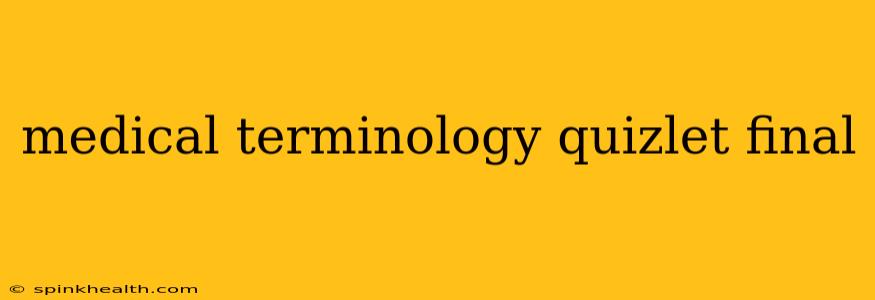Ace Your Medical Terminology Final: A Story of Triumph Over Terminology
The air hung thick with anticipation. The scent of nervous sweat mingled with the faint aroma of coffee brewing in the hallway outside the lecture hall. Finals week. The dreaded words echoed in the minds of every medical student, but for Sarah, the dread was amplified. Her medical terminology final loomed, a formidable obstacle in her path to becoming a doctor. She wasn't just nervous; she felt utterly overwhelmed by the sheer volume of prefixes, suffixes, and root words. This wasn't just a quiz; this was her future.
Sarah had diligently used Quizlet throughout the semester, creating flashcards and tirelessly quizzing herself. But tonight, the sheer volume of information felt insurmountable. She felt like she was drowning in a sea of medical jargon. Was all her hard work enough? Would she remember the difference between hyperplasia and hypertrophy? Would she be able to decipher the meaning of a complex medical term under pressure? Doubt gnawed at her.
But then, remembering a conversation with her mentor, Dr. Ramirez, Sarah took a deep breath. Dr. Ramirez had emphasized the importance not just of memorization, but of understanding the logic behind medical terminology. He had said, "Medical terms aren't random strings of letters; they're carefully constructed words that tell a story."
With renewed determination, Sarah reopened her Quizlet sets, but this time, she approached them differently. Instead of rote memorization, she focused on the building blocks:
Understanding the Building Blocks: Prefixes, Suffixes, and Root Words
- What are the common prefixes used in medical terminology?
This was a crucial question. Sarah had found that understanding common prefixes like hyper- (above normal), hypo- (below normal), a- or an- (without), and tachy- (rapid) was key to deciphering many complex terms. She went through her Quizlet sets, creating new sets focusing specifically on prefixes, categorizing them by meaning and examples. This systematic approach brought clarity to the chaos.
- What are the common suffixes used in medical terminology?
Suffixes like -itis (inflammation), -ectomy (surgical removal), -oma (tumor), and -pathy (disease) were equally crucial. Sarah realized that understanding the suffix often gave her a significant clue about the meaning of the whole word. She found it particularly helpful to visualize medical terms as sentences, with prefixes, root words, and suffixes representing different grammatical parts.
- What are some common root words and their meanings?
Sarah discovered that many root words derived from Greek and Latin provided the fundamental meaning. Understanding roots such as card- (heart), hepat- (liver), and nephr- (kidney) greatly simplified her understanding of organ-related terminology. She also found Quizlet's ability to create custom sets incredibly useful here, helping her break down complex terms into manageable chunks.
Putting it All Together: Deconstructing Medical Terms
- How do you break down a complex medical term into its component parts?
This was the key to mastering medical terminology. Sarah practiced dissecting complex terms. For instance, tachycardia becomes: tachy- (rapid) + cardi- (heart) + -ia (condition), indicating a rapid heart condition. She realized that if she understood the individual parts, the whole term became comprehensible.
- How can I improve my understanding of medical terminology using Quizlet?
Quizlet was a tool, but its effectiveness depended on how she used it. Sarah realized the importance of active recall, using spaced repetition and various quiz modes offered by Quizlet. She also started using the "learn" mode to actively engage with the material, rather than just passively reviewing flashcards. She even found herself creating her own sets from her notes, reinforcing the learning process.
- What are some effective strategies for memorizing medical terminology?
Simply staring at flashcards wasn't effective. Sarah found success in using mnemonics, creating visual aids, and even teaching the terms to a friend. Explaining concepts solidified her understanding, and it also helped her identify areas where she needed more clarification.
The day of the final arrived. Sarah walked into the examination hall, not with dread, but with confidence. She had conquered the chaos of medical terminology by understanding its underlying logic, effectively utilizing Quizlet, and actively engaging with the material. She approached each question methodically, dissecting the terms and drawing on her newfound understanding. When she left the examination hall, she felt a sense of accomplishment. She hadn't just passed a test; she had mastered a skill crucial to her future as a doctor. Her journey with Quizlet had been more than just memorization; it had been a journey of understanding and empowerment.

